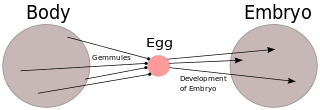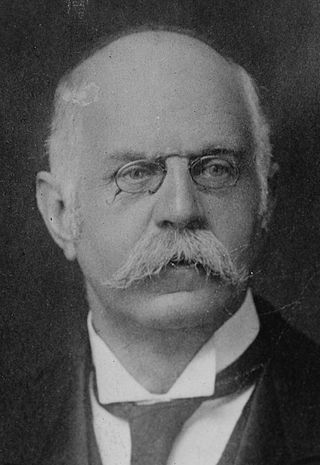
Eugenics is a set of beliefs and practices that aim to improve the genetic quality of a human population. Historically, eugenicists have altered various human gene frequencies by inhibiting the fertility of people and groups purported to be inferior or promoting that of those purported to be superior. Since the early 2020s, the term has seen a revival in bioethical discussions on the usage of new technologies such as CRISPR and genetic screening, with ongoing debate around whether these technologies should be considered eugenics or not.
Genius is a characteristic of original and exceptional insight in the performance of some art or endeavor that surpasses expectations, sets new standards for the future, establishes better methods of operation, or remains outside the capabilities of competitors. Genius is associated with intellectual ability and creative productivity. The term genius can also be used to refer to people characterised by genius, and/or to polymaths who excel across many subjects.

An intelligence quotient (IQ) is a total score derived from a set of standardised tests or subtests designed to assess human intelligence. The abbreviation "IQ" was coined by the psychologist William Stern for the German term Intelligenzquotient, his term for a scoring method for intelligence tests at University of Breslau he advocated in a 1912 book.

Pangenesis was Charles Darwin's hypothetical mechanism for heredity, in which he proposed that each part of the body continually emitted its own type of small organic particles called gemmules that aggregated in the gonads, contributing heritable information to the gametes. He presented this 'provisional hypothesis' in his 1868 work The Variation of Animals and Plants Under Domestication, intending it to fill what he perceived as a major gap in evolutionary theory at the time. The etymology of the word comes from the Greek words pan and genesis ("birth") or genos ("origin"). Pangenesis mirrored ideas originally formulated by Hippocrates and other pre-Darwinian scientists, but using new concepts such as cell theory, explaining cell development as beginning with gemmules which were specified to be necessary for the occurrence of new growths in an organism, both in initial development and regeneration. It also accounted for regeneration and the Lamarckian concept of the inheritance of acquired characteristics, as a body part altered by the environment would produce altered gemmules. This made Pangenesis popular among the neo-Lamarckian school of evolutionary thought. This hypothesis was made effectively obsolete after the 1900 rediscovery among biologists of Gregor Mendel's theory of the particulate nature of inheritance.
Psychometrics is a field of study within psychology concerned with the theory and technique of measurement. Psychometrics generally covers specialized fields within psychology and education devoted to testing, measurement, assessment, and related activities. Psychometrics is concerned with the objective measurement of latent constructs that cannot be directly observed. Examples of latent constructs include intelligence, introversion, mental disorders, and educational achievement. The levels of individuals on nonobservable latent variables are inferred through mathematical modeling based on what is observed from individuals' responses to items on tests and scales.

Sir Francis Galton was a British polymath and the originator of the behavioral genetics movement during the Victorian era.

Karl Pearson was an English eugenicist, mathematician, and biostatistician. He has been credited with establishing the discipline of mathematical statistics. He founded the world's first university statistics department at University College London in 1911, and contributed significantly to the field of biometrics and meteorology. Pearson was also a proponent of Social Darwinism and eugenics, and his thought is an example of what is today described as scientific racism. Pearson was a protégé and biographer of Sir Francis Galton. He edited and completed both William Kingdon Clifford's Common Sense of the Exact Sciences (1885) and Isaac Todhunter's History of the Theory of Elasticity, Vol. 1 (1886–1893) and Vol. 2 (1893), following their deaths.

James McKeen Cattell was the first professor of psychology in the United States, teaching at the University of Pennsylvania in Philadelphia. He was a long-time editor and publisher of scientific journals and publications, including Science, and served on the board of trustees for Science Service, now known as Society for Science from 1921 to 1944.

Historiometry is the historical study of human progress or individual personal characteristics, using statistics to analyze references to geniuses, their statements, behavior and discoveries in relatively neutral texts. Historiometry combines techniques from cliometrics, which studies economic history and from psychometrics, the psychological study of an individual's personality and abilities.

Leonard Darwin was an English politician, economist and eugenicist. He was a son of the naturalist Charles Darwin, and also a mentor to Ronald Fisher, a statistician and evolutionary biologist.

The Descent of Man, and Selection in Relation to Sex is a book by English naturalist Charles Darwin, first published in 1871, which applies evolutionary theory to human evolution, and details his theory of sexual selection, a form of biological adaptation distinct from, yet interconnected with, natural selection. The book discusses many related issues, including evolutionary psychology, evolutionary ethics, evolutionary musicology, differences between human races, differences between sexes, the dominant role of women in mate choice, and the relevance of the evolutionary theory to society.

Greatness is a concept of a state of superiority affecting a person or object in a particular place or area. Greatness can also be attributed to individuals who possess a natural ability to be better than all others. An example of an expression of the concept in a qualified sense would be "Hector is the definition of greatness" or "Napoleon was one of the greatest wartime leaders". In the unqualified sense it might be stated "George Washington achieved greatness within his own lifetime", thus implying that "greatness" is a definite and identifiable quality. Application of the terms "great" and "greatness" is dependent on the perspective and subjective judgements of those who apply them. Whereas in some cases the perceived greatness of a person, place or object might be agreed upon by many, this is not necessarily the case, and the perception of greatness may be both fiercely contested and highly idiosyncratic.

The Expression of the Emotions in Man and Animals is Charles Darwin's third major work of evolutionary theory, following On the Origin of Species (1859) and The Descent of Man (1871). Initially intended as a chapter in The Descent of Man, The Expression grew in length and was published separately in 1872. This book concerns the biological aspects of emotional behavior, and Darwin explores the animal origins of such human characteristics as smiling and frowning, the shrugging of shoulders, the lifting of the eyebrows in surprise, and the baring of teeth in an angry sneer. A German translation of The Expression appeared in 1872; Dutch and French versions followed in 1873 and 1874. Since its first publication, The Expression has never been out of print, but it has also been described as Darwin's "forgotten masterpiece"; psychologist Paul Ekman has argued that The Expression is the foundational text for modern scientific psychology.
The Adelphi Genetics Forum is a non-profit learned society based in the United Kingdom. Its aims are "to promote the public understanding of human heredity and to facilitate informed debate about the ethical issues raised by advances in reproductive technology."
Hereditarianism is the research program according to which heredity plays a central role in determining human nature and character traits, such as intelligence and personality. Hereditarians believe in the power of genetic influences to explain human behavior and [[eugenics|solve human social-political problems.]] They stress the value of evolutionary explanations in all areas of the human sciences.

Three International Eugenics Congresses took place between 1912 and 1932 and were the global venue for scientists, politicians, and social leaders to plan and discuss the application of programs to improve human heredity in the early twentieth century.
The stirpiculture experiment at the Oneida Community was the first positive eugenics experiment in American history, resulting in the planned conception, birth and rearing of 58 children. The experiment lasted from 1869–1879. It was not considered as part of the larger eugenics history because of its radical religious context. The term "stirpiculture" was used by John Humphrey Noyes, founder of the Oneida Community, to refer to his system of eugenics, or the breeding of humans to achieve desired perfections within the species. Noyes derived stirpiculture from the Latin word "stirps", which means "stock, stem, or root" (Carden). It has been claimed that Noyes coined the term two decades before Francis Galton created the term "eugenics". In 1904, Galton claimed that he had first come up with the term and "deliberately changed it for eugenics," a claim supported in print by George Willis Cooke. In his 1883 book Inquiries into Human Faculty and Its Development, Galton noted that his new term "eugenics" was a suitable replacement for the older term "viriculture" that he had invented, suggesting that he had confused the two terms "viriculture" and "stirpiculture."
The history of the race and intelligence controversy concerns the historical development of a debate about possible explanations of group differences encountered in the study of race and intelligence. Since the beginning of IQ testing around the time of World War I, there have been observed differences between the average scores of different population groups, and there have been debates over whether this is mainly due to environmental and cultural factors, or mainly due to some as yet undiscovered genetic factor, or whether such a dichotomy between environmental and genetic factors is the appropriate framing of the debate. Today, the scientific consensus is that genetics does not explain differences in IQ test performance between racial groups.
The history of eugenics is the study of development and advocacy of ideas related to eugenics around the world. Early eugenic ideas were discussed in Ancient Greece and Rome. The height of the modern eugenics movement came in the late 19th and early 20th centuries.
Nicholas Wright Gillham was an American geneticist who served as the James B. Duke Professor of Biology at Duke University. In addition to his scientific research, he is known for his 2001 biography of Francis Galton, A Life of Sir Francis Galton: From African Exploration to the Birth of Eugenics.












